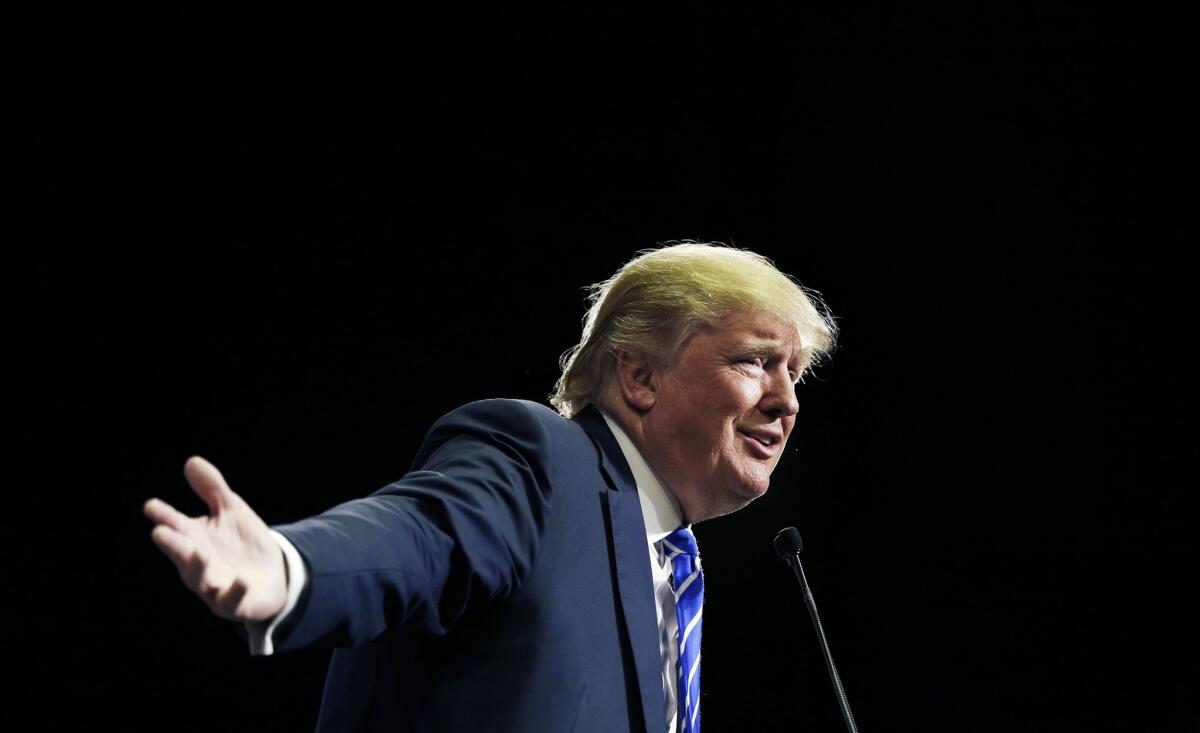Column: Call Trumpism what it is: a cult

The comparisons have come hard and fast, at least since 2015. Trump is like Silvio Berlusconi, like Adolf Hitler, like Boris Johnson. A 2018 film called “The Trump Prophecy” took the evangelical route, comparing Trump to Cyrus the Great, the 6th century BC Persian monarch chosen by God to free Jewish captives in Babylon.
But maybe it’s time to stop searching for the exact analogy for Trump, be he Cyrus or Boris, Adolf or a Silvio. What demands analysis is less the arrogant 73-year-old mediocrity in the Oval Office, but the worshipful attitude so many Americans have toward him.
A lot of nut jobs have peddled lies to Americans before, and even styled themselves as messianic. But at no time in history have so many Americans been drawn to what’s looking increasingly like a cult. I don’t use the term recklessly.
When Steven Hassan, an expert in cults and an ex-Moonie (as in the Unification Church, founded by a Korean businessman, the Rev. Sun Myung Moon), published “The Cult of Trump” last spring, some reviewers objected to his use of the cult framework as incendiary and not all that useful.
Indeed, for Trump critics to call his admirers cult members might be just another salvo in our nasty political warfare. It’s similar to the Trump psychologizing over the years that often doubles as name-calling: He’s a baby, a psychopath, a stone-cold narcissist.
The discourse around cults partakes of some woolly theories. “Mind control” and “brainwashing” are shibboleths from the 1950s, when the coinages were used to describe what Chinese Communists did to convert freethinkers to their cause. The implicit suggestion is that unsavory ideas and ideologies can only win adherents using extreme and witchy measures.
All that put me off the notion of Trumpism as a cult. But then in August, Trump looked heavenward and called himself “the chosen one.”
Suddenly, among evangelicals, it wasn’t enough to make comparisons with Cyrus or even King David. He had to be the savior himself. The far-right radio host Wayne Allyn Root called Trump “the second coming of God.” Then former Energy Secretary Rick Perry straight up affirmed Trump’s craziness, telling him, “You are here in this time because God ordained you.”
As 2019 drew to a close, my doubts about Trumpism as a cult dissolved. And I’m not alone.
Republican lawyer George Conway reportedly described his wife, Trump’s presidential counselor Kellyanne Conway, as a member of a cult. Former GOP strategist John Weaver has used the term. Anthony Scaramucci, Trump’s onetime communications director, concurs. Also news vet Dan Rather, conservative political scientist Norman Ornstein, science journalist Steve Silberman, pastor John Pavlovitz and academic and journalist Jared Yates Sexton.
What the cult diagnosis may lack in scholarly rigor, it makes up for in explanatory power. When polled, far too many Republicans come across as having abandoned their commitment to libertarianism, family values or simple logic in favor of Trump worship. They’re lost to paranoia and factually unmoored talking points, just the way Hassan was lost to Sun Myung Moon.
It can be heartbreaking when loved ones succumb to Trumpism. (It’s a double whammy when your grief is dismissed as liberal tears.) A true believer undergoes a “radical personal change,” as Hassan puts it. The person you once knew seems somehow ... not there.
Journalists Luke O’Neil and Edwin Lyngar, as well as Jen Senko in “The Brainwashing of My Dad,” have compiled stories of Americans who have gone over. O’Neil summarized the transformation this way: “A loved one … sat down in front of Fox News, found some kind of deep, addictive comfort in the anger and paranoia, and became a different person.”
Sounds about right.
Hassan — who remembers, during his Moonie days, shouting, “I don’t care if Moon is like Hitler. I’ve chosen to follow him, and I’ll follow him to the end” — broke free, and became an expert on cults and how to leave them. He has spent his career proving it’s possible.
To see Trumpism as a cult is not to refuse to engage with its effects, the crimes committed in its name or the way it has awakened and emboldened the cruelest and most destructive beliefs and practices in the American playbook. Instead, the cult framework should relieve the pressure many of us feel to call Trumpites back to themselves, to keep arguing with them. They are stuck in a bad relationship with a controlling figure.
Understanding Trump is a fool’s errand. He’s sui generis, and far too erratic and finally insubstantial to reward close attention. Trump zealots are another matter. They are part of the tradition of radical converts in American history who elected to forfeit their authentic personalities and principles rather than refine or strengthen them. We need to stay focused on how so many Americans came to this pass and took this destructive course. The Trump cult will define American politics for decades to come, even after its dear leader is gone.
Twitter: @page88
More to Read
A cure for the common opinion
Get thought-provoking perspectives with our weekly newsletter.
You may occasionally receive promotional content from the Los Angeles Times.










